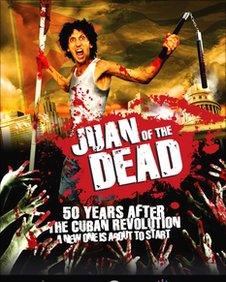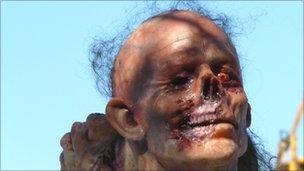Cuba shoots its first zombie movie Juan Of The Dead
- Published

Juan Of The Dead: Cuba's answer to Shaun Of The Dead
Blood-spattered, flesh-eating monsters have been roaming the Cuban capital, Havana, in recent months - all part of filming for the country's first zombie movie.
Bearing a similar title to Britain's 2004 comedy horror Shaun Of The Dead, Juan Of The Dead's plot is actually closer to the 1984 ghoul classic Ghostbusters.
In the film, an entire city is overrun by zombies while Cuba's Communist leaders insist it is just a plot by US-backed dissidents to bring down the government.
So it is left to hero Juan - played by Cuban actor Alexis Diaz de Villegas - to rid the island of the undead for money.
But as the zombie outbreak begins to spread, he is left with no choice but to fight for his own survival.
The film, due for release later this year, was written and directed by 34-year-old Alejandro Brugues.
It is only his second movie since graduating from Cuba's International School of Film and Television.
"It's a zombie film but it's about Cubans and how we react in the face of a crisis because we've had a lot of them here over the last 50 years," Brugues told the BBC World Service's The Strand.
"It is a social comedy, it has a bit of everything. It has horror, it has action and it pretty much laughs in the face of problems."
The movie is a joint Cuban-Spanish production with much of the funding coming from overseas.
It is the latest in a wave of independent cinema which has been struggling to find its feet after state funding all but dried up following the collapse of the Soviet Union in 1991.
Strawberry And Chocolate, which dealt with gays rights at a time when homosexuality was still illegal in Cuba, was the last film to enjoy international success after it was nominated for an Oscar in 1994.
Although Cuban cinema has been struggling in recent years, for many decades it was a flourishing industry.
Art-house classics
Shortly after the Cuban revolution in 1959, leader Fidel Castro created the Cuban Film Institute, known as ICAIC.

Will Juan of the Dead been successful in and outside Cuba?
He believed that cultural and political change should go hand in hand.
As a result, many films such as the 1966 movie Death Of A Bureaucrat and 1968's Memories Of Underdevelopment, both directed by Tomas Gutierrez Alea, became art-house classics.
Humberto Solas' Lucia, which explores the lives of three women living through the country's political and social revolutions at three different points in history, is also considered a landmark in Cuban cinema.
It won the Golden Prize at the 1969 Moscow International Film Festival.
Cinema history
US director John Landis, who made the 1981 comedy horror classic An American Werewolf In London, in November visited the international school where Brugues studied.
He hailed the country's history and passion for film.
"Cuba has a great history of cinema and they've always been avid filmgoers," Landis said.
"After the revolution, Cubans used to steal prints from Miami and they'd have first-run movies. So movies would play in Havana before they'd play in LA. How did that happen?"
He added: "Cuban cinema has always been interesting and what is fun now is how they make political films because they always disguise it."
While there seems to be a sense of excitement building around Juan Of The Dead in Cuba, Brugues believes the industry needs to move with the times if the rest of the world is to sit up and take notice.
"At the moment there are two trends, films produced by the Cuba's state production company and films made outside of that," he said.
"There needs to be a balance but I think the two will eventually merge. When this happens I think this will produce the best Cuban cinema."
Cuban filmmakers must have their scripts approved by the government